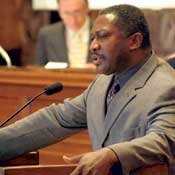The legislative agenda for Jackson that Mayor Harvey Johnson Jr. unveiled yesterday is short and cheap, but most items on the wish list will still face an uphill battle when the state Legislature convenes again in January. Jackson's legislative delegation will likely encounter more resistance than in past years, thanks to a budget crisis that will make legislators especially tight-fisted.
Johnson presented three measures to the City Council's legislative committee yesterday. Only one would cost the state money: a request for the state to reassume maintenance of state highways 49 and 51, known locally as Medgar Evers Boulevard and State Street, respectively, within the city limits. In the early 1970s, under then-Mayor Russell Davis, the city reached an agreement with the Mississippi Highway Department to take over maintenance of the two state roads. At the time, the city's financial situation suggested that it could afford to maintain the roads better than could the state. That has changed, of course.
"This was a terrible mistake when it was made, early on," former Ward 2 City Councilman Leslie McLemore said of the 1970s decision. "It needs to be corrected. It's a matter of appealing not only to people in the Hinds County delegation, but appealing to legislators throughout the state to really help protect the aesthetics of the capital city."
City Spokesman Chris Mims could not provide an estimate for how much the city currently spends maintaining the two highways, but he said that resurfacing one would easily cost multiple millions of dollars.
Several major hurdles stand in the proposal's way. Getting the state to take on those maintenance costs in a lean budget year will prove challenging, and even before the Mississippi Department of Transportation will consider re-adopting the roads, the city must bring them up to state standards.
MDOT officials have estimated that that process could cost up to $100 million, state Sen. John Horhn, D-Jackson, said.
"It's going to be a tough proposition, but it makes a lot of sense, given that this is the capital city and MDOT maintains these highways in other cities," Horhn said.
"What may work in our favor on this issue is that no one can find any paperwork that officially transferred those two roads in question from the state to the city," Horhn added. "It may be that it was a gentleman's agreement. We would have a leg to stand on in that case."
Johnson also wants state approval to expand the Jackson Public Schools Board of Trustees from five to seven members, to better reflect the city's division into seven wards. Under the current configuration, the mayor solicits recommendations for board appointments from City Council members on a rotating basis. Johnson appointed two new board members last month who represent Wards 4 and 7; Wards 2 and 6 currently have no representation on the board.
"We think it would be beneficial for everyone involved if the school board were expanded to seven because it would give appropriate representation to every ward in the city," Mims said.
Former Ward 2 City Councilman Leslie McLemore approved of Johnson's request, saying it would improve the politics of the appointment process.
"It's much more of a clear-cut issue, because then it's really the mayor and the councilperson of that ward agreeing, in principle, on school board appointments," McLemore said. "Now, with the rotational system, sometimes there are trade-offs."
He added that the addition of two board members would not necessarily slow the board's decision-making process, noting that seven-member City Council meetings frequently take less time than meetings of the current five-member school board, which often stretch past three hours.
Its merits notwithstanding, the expansion measure may not prove popular with other legislators, Horhn said. The senator said that a state bill allowing Jackson to enlarge its board would probably have to apply to all school boards in the state.
A more palatable proposal is Johnson's request that the state allow cities like Jackson to charge property owners for the cost of demolishing or cleaning dilapidated property. The proposed bill would allow cities to add the cost to the owners' property taxes, relieving some of the burden of fighting urban blight from the city.
"We spend quite a bit of money every year addressing dilapidated housing, overgrown lots and other code violations," Mims said. "Currently, if the owner does not pay, we place a lien on the property, and that money is not recouped until that property is sold. Sometimes that can be years and years, and we don't get very much money back. We think this would be an incentive for property owners to not only take care of their property and allow the city to recoup some of the money."
Horhn said that the only opposition he could foresee to the request would be from clerk's offices saddled with potential additional administrative costs would not appreciate the added workload. By adding a fee to cover the additional costs to the maintenance charge, Jackson's legislative delegation could appease even those few oppponents, Horhn said.



Comments
Use the comment form below to begin a discussion about this content.